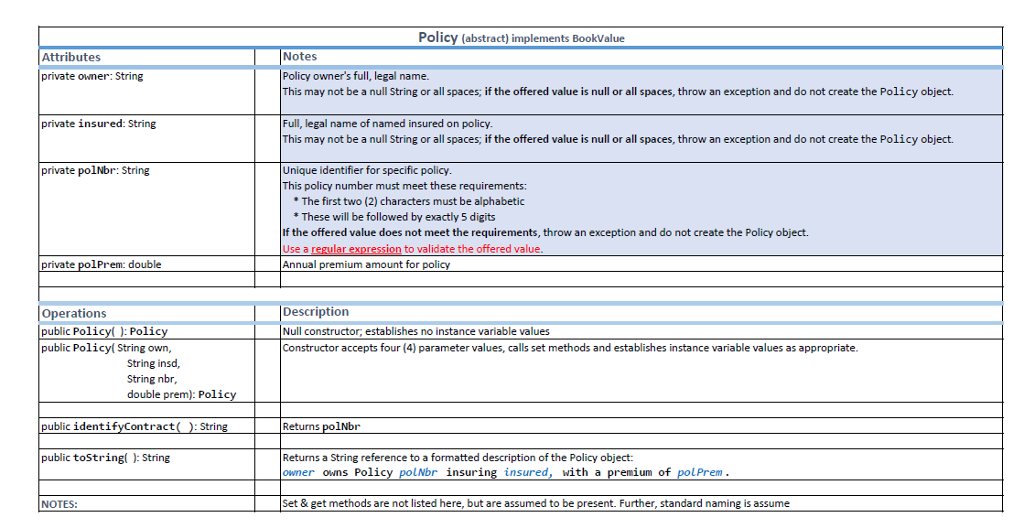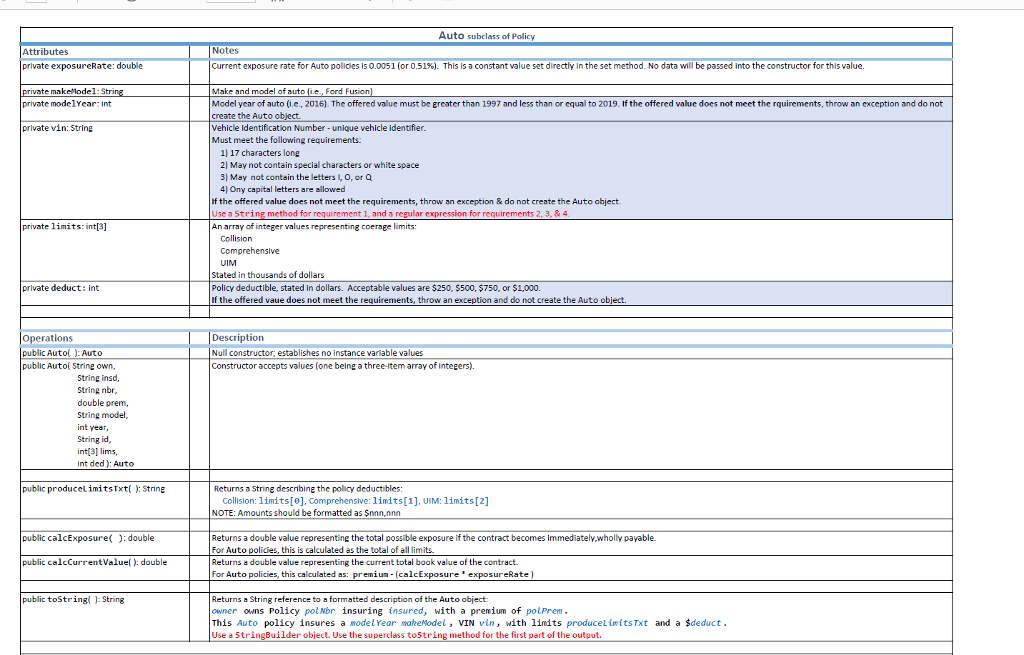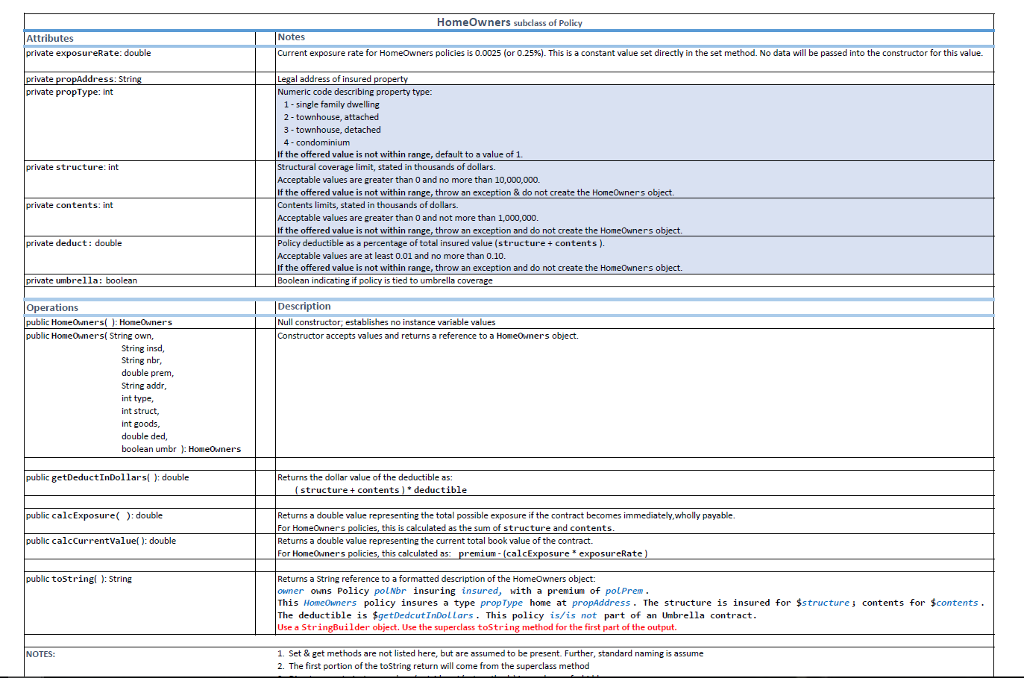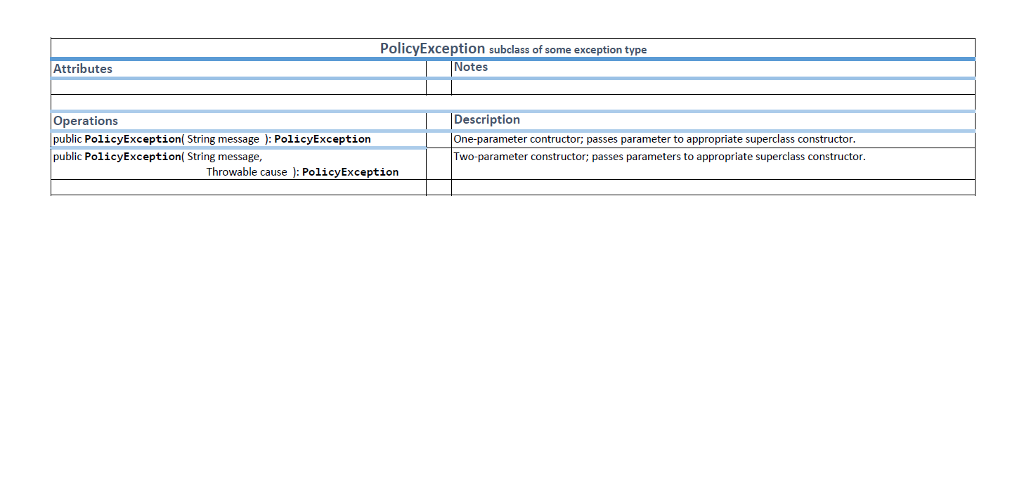Question: Java - Modify provided code to UML Java USE REGULAR EXPRESSION WHERE REQUIRED PROVIDED CODE: public abstract class Policy implements BookValue { //Instance Variables private
Java - Modify provided code to UML




Java
USE REGULAR EXPRESSION WHERE REQUIRED
PROVIDED CODE:
public abstract class Policy implements BookValue { //Instance Variables private String owner, insured, polNbr; private double polPrem; //Null constructor public Policy() { } //Full constructor public Policy(String own, String insd, String nbr, double prem) { setOwner(own); setInsured(insd); setPolNbr(nbr); setPolPrem(prem); } /* * SET METHODS */ public final void setOwner(String own) { owner = own; } public final void setInsured(String insd) { insured = insd; } public final void setPolNbr(String nbr) { polNbr = nbr; } public final void setPolPrem(double prem) { polPrem = prem; } /* * GET METHODS */ public final String getOwner() { return owner; }
public final String getInsured() { return insured; } public final String getPolNbr() { return polNbr; } public final double getPolPrem() { return polPrem; } /* * OTHER METHODS AS NEEDED */ //returns the policy number public String identifyContract() { return polNbr; } //converts data to a formatted sentence public String toString()//Superclass toString method, formats base data for both types of insurance { NumberFormat nf = NumberFormat.getInstance();//initialize NumberFormat object String Prem = nf.format(getPolPrem());//uses NumberFormat to convert PolPrem to a String with the correct formatting return String.format("%s owns Policy %s, insuring %s, with a premium of $%s", getOwner(),getPolNbr(),getInsured(),Prem); } }//end class
--------------------------------------------------------------------------------------
public class Auto extends Policy
{
//instance variables
private double exposureRate;
private String makeModel;
private int modelYear;
private String vin;
private int limits[] = new int[3];
private int deduct;
/ull constructor
public Auto()
{
super();
}
//Full constructor
public Auto(String own,String insd,String nbr,double prem,String model,int year,String id,int[]lims,int ded)
{
super(own,
insd,
nbr,
prem);
setExposureRate();
setMakeModel(model);
setModelYear(year);
setVin(id);
setLimits(lims);
setDeduct(ded);
}
/*
* SET METHODS
*/
public final void setExposureRate()
{
exposureRate = .0051;//sets exposureRate explicitly
}
public final void setMakeModel(String model)
{
makeModel = model;
}
public final void setModelYear(int year)
{
modelYear = year;
}
public final void setVin(String id)
{
vin = id;
}
public final void setLimits(int[] lims)
{
limits = lims;
}
public final void setDeduct(int ded)
{
deduct = ded;
}
/*
* GET METHODS
*/
public final double getExposureRate()
{
return exposureRate;
}
public final String getMakeModel()
{
return makeModel;
}
public final int getModelYear()
{
return modelYear;
}
public final String getVin()
{
return vin;
}
public final int[] getLimits()
{
return limits;
}
public final int getDeduct()
{
return deduct;
}
/*
* OTHER METHODS AS NEEDED
*/
//converts ints from the limits array to a formatted string and returns it.
public String produceLimitsTxt()
{
String[]LimitHold = new String[3];//creates an array to store formatted numbers
NumberFormat nf = NumberFormat.getInstance();//creates numberformat object
for(int ctr = 0; ctr
{
LimitHold[ctr] = nf.format(getLimits()[ctr] * 1000);//uses numberformat to format to correct US standard and store them in the array
}
return String.format("Collision: $%s.00, Comprehensive: $%s.00, UIM:$%s.00",LimitHold[0],LimitHold[1],LimitHold[2]);
}
//calculates exposure using values passed in the array
public double calcExposure()
{
double tmp = getLimits()[0]+getLimits()[1]+getLimits()[2];
return tmp * 1000;
}
//calculates current value using provided equation
public double calcCurrentValue()
{
return getPolPrem() - (calcExposure() * getExposureRate());//simplified to one line for simplicity
}
//auto toString function, concatenates superclass toString with subclass variables to produce a formatted sentence.
public String toString()
{
NumberFormat Form = NumberFormat.getInstance();//creates number format object to format deductible var
//super.toString provides us the base value sentence already formatted, here we just add the auto specific data to it
return String.format(super.toString()+" This Auto policy " +
"insures a %d %s, VIN %s with limits of %s and a deductible of $%s.00 ",
getModelYear(),getMakeModel(),
getVin(),produceLimitsTxt(),Form.format(getDeduct()));
}
}//end class
public class HomeOwners extends Policy implements BookValue
{
//instance variables
private double exposureRate;
private String propAddress;
private int propType;
private int structure;
private int contents;
private double deduct;
private boolean umbrella;
//Homeowners null constructor
public HomeOwners()
{
super();
}
//Homeowners Full constructor
public HomeOwners(String own,String insd,String nbr,double prem,String addr, int type,int struct,int goods,double ded,boolean umbr)
{
super(own,
insd,
nbr,
prem);
setExposureRate();
setPropAddress(addr);
setPropType(type);
setStructure(struct);
setContents(goods);
setDeduct(ded);
setUmbrella(umbr);
}
/*
* SET METHODS
*/
public final void setExposureRate()
{
exposureRate = .0025;//explicitly sets exposure rate
}
public final void setPropAddress(String addr)
{
propAddress = addr;
}
public final void setPropType(int type)
{
propType = type;
}
public final void setStructure(int struct)
{
structure = struct;
}
public final void setContents(int goods)
{
contents = goods;
}
public final void setDeduct(double ded)
{
deduct = ded;
}
public final void setUmbrella(boolean umbr)
{
umbrella = umbr;
}
/*
* GET METHODS
*/
public final double getExposureRate()
{
return exposureRate;
}
public final String getPropAddress()
{
return propAddress;
}
public final int getPropType()
{
return propType;
}
public final int getStructure()
{
return structure;
}
public final int getContents()
{
return contents;
}
public final double getDeduct()
{
return deduct;
}
public final boolean getUmbrella()
{
return umbrella;
}
/*
* OTHER METHODS AS NEEDED
*/
//calculates the deductible with provided formula
public double getDeductInDollars()
{
return (getStructure() + getContents()) * getDeduct();
}
//calculates Exposure based on provided equation, we multiply by 1000 to return the real value
public double calcExposure()
{
return (getStructure() + getContents()) * 1000;
}
//calculates current value based on equation provided
public double calcCurrentValue()
{
return getPolPrem() - (calcExposure() * getExposureRate());
}
//shows output
public String toString()
{
String boo;//defines a string boo which will be inserted into the String
if(getUmbrella())//Determines whether getUmbrella is true or false
boo = "is";//If it is true, sets boo to "is" which is the correct language for the string below.
else
boo = "is not";//If it is not true sets boo to "is not" which is the correct language for the string below.
//begin number formatting
//Number format object creation
NumberFormat nf = NumberFormat.getInstance();
//Assigns values to strings with proper US formatting.
String StructHold = nf.format(getStructure() * 1000);
String ContHold = nf.format(getContents() * 1000);
String DedHold = nf.format(getDeductInDollars() * 1000);
//end number formatting
//below assignment uses super.toString to get the base formatted string from Policy and appends the relevant data specific to homeowners.
return String.format(super.toString()+" This HomeOwners policy insures a type %d home at %s. The structure is insured for $%s.00; " +
"contents for $%s.00. The deductible is $%s.00. This policy %s part of an Umbrella contract. "
,getPropType(),getPropAddress(),StructHold,ContHold,DedHold,boo);
}
}//end class
-----------------------------------------------------------------------------------------
------------------------------------------------------------------------------------
public interface BookValue { public String identifyContract();
public double calcExposure();
public double calcCurrentValue();
}//end interface
----------------------------------------------------------------------------------------
/**
* Test Harness
*
* DO NOT CHANGE CODE IN THIS TEST HARNESS!
*
* This test harness, with the 'helper' class KeyboardInput, will allow for continuous data entry from the keyboard.
*
* You will want to fully test each validation you've written. Only one validation error per object entry can be
* caught and reported. This means you'll need to do A LOT OF TESTING to test all of your validations.
*/
Test Harness
//import KeyboardInput // The import is not necessary, but it's good to remember we're using this!
public class Test_XcptnHandling
{
// This object ( myPolicy) provides a 'holding space' for a reference to an object in the InsurancePolicy hierarchy.
// NOTE: We are NOT INSTANTIATING an InsurancePolicy object here, just setting up a reference.
private static Policy myPolicy;
/*************************************************************************************************************
* The main method will consist of a continuous input loop based on the boolean variable goAgain.
* Use a while loop (while goAgain = true) to contol processing:
* Ask user which type of policy to create
* If Auto
* call method to create Auto object
* ElseIf HomeOwners
* call method to create HomeOwners object
* Else
* Tell user valid options
* Ask user whether to continue
*************************************************************************************************************/
public static void main(String[] args)
{
boolean goAgain = true; // Set the initial value of the loop control variable to continue the loop.
while ( goAgain ) // Initiate an input loop based on the control variable
{
try // The try block is placed INSIDE the loop to allow continous input
{
/*
* The following statement calls the acceptString method of KeyboardInput. The charAt method of the returned
* String object is then called to retrieve the first character of the String. That char is then converted
* to upper case and the resulting value is stored in the variable polType
*/
char polType = Character.toUpperCase(
KeyboardInput.acceptString(
"Build an Auto policy (A) or a HomeOwners policy (H)? " ).charAt(0) );
/*
* Test variable polType. If the value is 'A', go on to collect data to create an Auto object.
* If the value is 'H', collect data to create a HomeOwners object.
* If the value is neither, let the user know what the acceptable values are.
*/
if( polType == 'A' )
{
buildAutoPolicy( ); // Call method to collect data and instantiate an Auto object
}
else
if( polType == 'H' )
{
buildHomeOwnersPolicy( ); // Call method to collect data/instantiate a HomeOwners object
}
else
{
// Remind user of the acceptable responses to the question about policy type...
System.out.printf( "%n%s%n", "You must select Auto (A) or HomeOwners (H)." );
}
} // end try block
catch( PolicyException buildError )
{
// Catch any validation exception that may have been thrown and display to the console.
System.out.printf( "%n%s%n", buildError.getMessage( ) );
} // end catch block
// Aks user if they wish to continue the loop -- the loop does not end if a PolicyException was thrown.
goAgain = KeyboardInput.acceptBoolean( "Do you wish to enter another? true or false " );
} // end while loop
System.out.printf( "%nThanks for playing!%n" );
} // end main method
/*************************************************************************************************************
* Use methods of KeyboardInput to deliver prompts and accept input from user.
* Collect values for all non-static instance variables fo class Auto.
* Instantiate an Auto object using those values; assign the object reference to myPolicy
* Call the toString method of myPolicy to output information about the instantiated object
*
* IF a PolicyException is thrown, it is NOT CAUGHT AT THIS LEVEL; it is 'passed through' to the main method
* and will be caught & handled there.
*************************************************************************************************************/
private static void buildAutoPolicy( )
throws PolicyException
{
// Variables to hold values required for the superclass level (InsurancePolicy)
String own, insd, pol;
double prem;
// Variables to hold values required for Auto subclass
String mkMod, vin;
int year, coll, comp, uim, ded;
int[] limits = new int[3];
// Gather superclass level values
own = KeyboardInput.acceptString( "Policy Owner: " );
insd = KeyboardInput.acceptString( "Insured: " );
pol = KeyboardInput.acceptString( "Policy Number (2 letters, 5 digits): " );
prem = KeyboardInput.acceptDouble( "Annual premium (no dollar sign): " );
// Gather Auto subclass level values
mkMod = KeyboardInput.acceptString( "Make & Model (i.e., Ford Fusion): " );
year = KeyboardInput.acceptInteger( "Year of car (four digits): " );
vin = KeyboardInput.acceptString( "VIN (17 characters): " );
coll = KeyboardInput.acceptInteger( "Collision limit (no dollar sign): " );
comp = KeyboardInput.acceptInteger( "Compehensive limit (no dollar sign): " );
uim = KeyboardInput.acceptInteger( "Uinsured Motorist limit (no dollar sign): " );
ded = KeyboardInput.acceptInteger( "Deductible (no dollar sign): " );
// load limits array
limits[0] = coll;
limits[1] = comp;
limits[2] = uim;
// Instantiate object; set myPolicy to refer to new object
myPolicy = new Auto( own, insd, pol, prem,
mkMod, year, vin, limits, ded );
System.out.printf( "%n%s%n", myPolicy.toString( ) );
} // end buildAutoPolicy
/*************************************************************************************************************
* Use methods of KeyboardInput to deliver prompts and accept input from user.
* Collect values for all non-static instance variables fo class HomeOwners.
* Instantiate an HomeOwners object using those values; assign the object reference to myPolicy
* Call the toString method of myPolicy to output information about the instantiated object
*
* IF a PolicyException is thrown, it is NOT CAUGHT AT THIS LEVEL; it is 'passed through' to the main method
* and will be caught & handled there.
*************************************************************************************************************/
private static void buildHomeOwnersPolicy( )
throws PolicyException
{
// Variables to hold values required for the superclass level (InsurancePolicy)
String own, insd, pol;
double prem;
// Variables to hold values required for HomeOwners subclass
String address;
int type, struct, cont;
double deduct;
boolean umb;
// Gather superclass level values
own = KeyboardInput.acceptString( "Policy Owner: " );
insd = KeyboardInput.acceptString( "Insured: " );
pol = KeyboardInput.acceptString( "Policy Number (2 letters, 5 digits): " );
prem = KeyboardInput.acceptDouble( "Annual premium (no dollar sign): " );
// Gather HomeOwners subclass level values
address = KeyboardInput.acceptString( "Property Address: " );
type = KeyboardInput.acceptInteger( "Property Type Code (1 - 5): " );
struct = KeyboardInput.acceptInteger( "Insured value of structure: " );
cont = KeyboardInput.acceptInteger( "Insured value of contents: " );
deduct = KeyboardInput.acceptDouble( "Deductible as a Percentage of value (i.e., .05 for 5%): " );
umb = KeyboardInput.acceptBoolean( "Is this part of an Umbrella contract (true or false)?" );
// Instantiate object; set myPolicy to refer to new object
myPolicy = new HomeOwners( own, insd, pol, prem,
address, type, struct, cont, deduct, umb );
System.out.printf( "%n%s%n", myPolicy.toString( ) );
} // end buildHomeOwnersPolicy
} // end Test_XcptnHandling test harness
Helper class
/**
* This is essentially a 'helper' class holding methods for retrieving keyboard input
*
* The methods assume a Scanner object named input has been associated with the keyboard.
*
* Each static method requires as input a String value to be used as a prompt to the user.
*
* Each static method returns a different primitive data type to the caller.
*/
--------------------------------------------------------------------------------------
import java.util.Scanner;
public class KeyboardInput
{
public static Scanner input = new Scanner( System.in );
/*******************************************************************************************************************
* Methods for collecting user input from keyboard
*******************************************************************************************************************/
/********************************************************************************
* This method returns a String
* 1. Ask the user for the necessary input
* 2. Return that input to the calling method
********************************************************************************/
public static String acceptString( String prompt )
{
System.out.printf( "%n%s%n", prompt);
return input.nextLine();
} // end acceptString
/********************************************************************************
* This method returns an int
* 1. Ask the user for the necessary input
* 2. Clear the 'hanging' line feed from the keyboard
* 3. Return the int value to the calling method
********************************************************************************/
public static int acceptInteger( String prompt )
{
System.out.printf( "%n%s%n", prompt );
int aNumber = input.nextInt();
input.nextLine();
return aNumber;
} // end acceptInteger
/********************************************************************************
* This method returns a double
* 1. Ask the user for the necessary input
* 2. Clear the 'hanging' line feed from the keyboard
* 3. Return the double value to the calling method
*******************************************************************************/
public static double acceptDouble( String prompt )
{
System.out.printf( "%n%s%n", prompt);
double aNumber = input.nextDouble();
input.nextLine();
return aNumber;
} // end acceptDouble
/********************************************************************************
* This method returns a float
* 1. Ask the user for the necessary input
* 2. Clear the 'hanging' line feed from the keyboard
* 3. Return the float value to the calling method
*******************************************************************************/
public static float acceptFloat( String prompt )
{
System.out.printf( "%n%s%n", prompt);
float aNumber = input.nextFloat();
input.nextLine();
return aNumber;
} // end acceptDouble
/********************************************************************************
* This method returns a boolean
* 1. Ask the user for the necessary input
* 2. Return the boolean value to the calling method
*******************************************************************************/
public static boolean acceptBoolean( String prompt )
{
System.out.printf( "%n%s%n", prompt);
boolean aSwitch = input.nextBoolean();
return aSwitch;
} // end acceptDouble
Policy (abstract) implements BookValue Notes Attributes private owner: String Policy owner's full, legal name. is may not be a null String or all spaces; if the offered value is null or all spaces, throw an exception and do not create the Policy object. private insured: String Full, legal name of named insured on policy is may not be a null String or all spaces, if the offered value is null or all spaces, throw an exception and do not create the Policy object. private polNbr: String Unique identifier for specific policy s policy number must meet these requirements: The first two (2) characters must be alphabetic *These will be followed by exactly 5 digits If the offered value does not meet the requirements, throw an exception and do not create the Policy object. Use a Annual to validate the offered value olPrem: double ium amount for Operations public Policyl ): Polic public Policy( String own, Description Null constructor, establishes no instance variable values Constructor accepts four (4) parameter values, calls set methods and establishes instance variable values as appropriate String insd, String nbr, double prem): Polic ublic identifyContract Stri Returns polNbr public toStringl : String Returns a String reference to a formatted description of the Policy object owner owns Polic LNbr insuring insured, with a um of polPrem NOTES: Set & get methods are not listed here, but are assumed to be present. Further, standard naming is assume Policy (abstract) implements BookValue Notes Attributes private owner: String Policy owner's full, legal name. is may not be a null String or all spaces; if the offered value is null or all spaces, throw an exception and do not create the Policy object. private insured: String Full, legal name of named insured on policy is may not be a null String or all spaces, if the offered value is null or all spaces, throw an exception and do not create the Policy object. private polNbr: String Unique identifier for specific policy s policy number must meet these requirements: The first two (2) characters must be alphabetic *These will be followed by exactly 5 digits If the offered value does not meet the requirements, throw an exception and do not create the Policy object. Use a Annual to validate the offered value olPrem: double ium amount for Operations public Policyl ): Polic public Policy( String own, Description Null constructor, establishes no instance variable values Constructor accepts four (4) parameter values, calls set methods and establishes instance variable values as appropriate String insd, String nbr, double prem): Polic ublic identifyContract Stri Returns polNbr public toStringl : String Returns a String reference to a formatted description of the Policy object owner owns Polic LNbr insuring insured, with a um of polPrem NOTES: Set & get methods are not listed here, but are assumed to be present. Further, standard naming is assume
Step by Step Solution
There are 3 Steps involved in it

Get step-by-step solutions from verified subject matter experts


